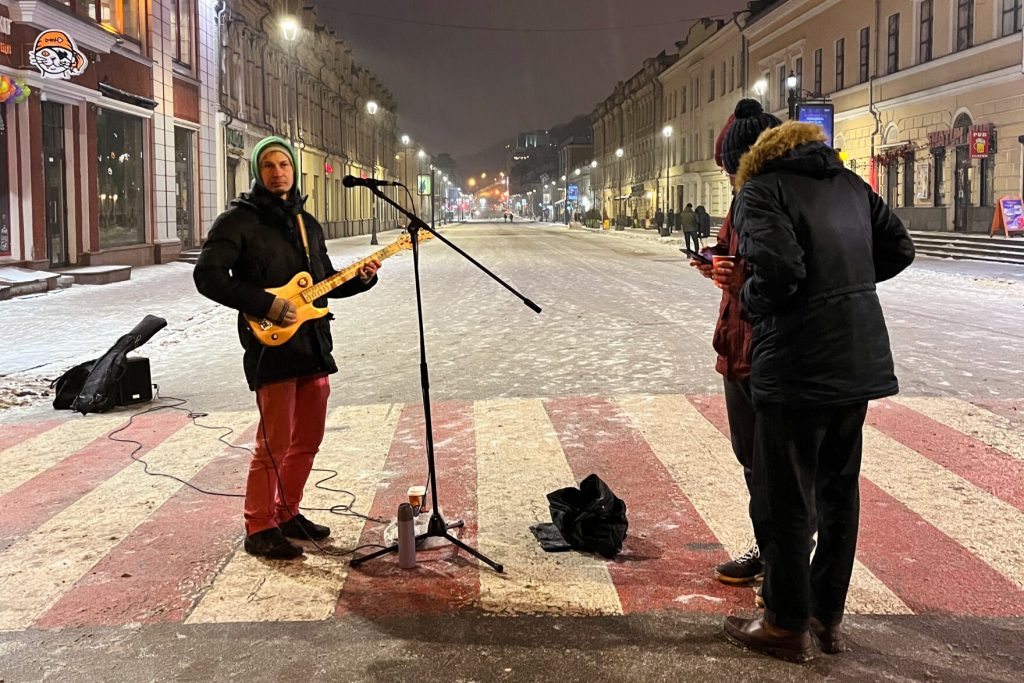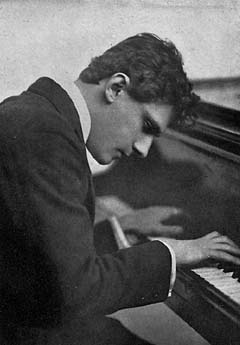by Jarrett Hoffman

•An article about Ukrainian musicians and national pride
•Concerts from CIM Opera Theater, Cleveland Composers Guild, The Cleveland Orchestra, and Oberlin faculty and guests, plus a jazz piano master class and more from CSU
•Micro-operas now on-demand from the Operas [in Place] festival, an extended deadline for Orchestrating Change Leadership Program nominations, and a piano and keyboard donation program from Piano Cleveland
•Coming up on the calendar: Apollo’s Fire’s “Feeling Blue: Baroque Meets Jazz”
•Almanac: Ukrainian-born American composer and pianist Leo Ornstein, once one of the most recognizable names in American classical music
IN UKRAINE:
Given the news this morning of Russia’s attack on Ukraine, read a recent article by Daniel Estrin and Olena Lysenko for NPR titled “For Ukrainian musicians, rejecting Russia is a matter of national pride.” It describes issues such as touring, language, and musical traditions, partly in connection to the Eurovision song contest. (Pictured above: guitarist Vitaly Abramov, one of the musicians interviewed in the article, in downtown Kyiv. Photo by Daniel Estrin.)
THURSDAY’S CONCERTS:
This evening offers five options:
At 7:00 pm, CIM Opera Theater delves into the world of Shakespeare (livestream only, free), and the Cleveland Composers Guild presents a concert of chamber music at KSU Stark’s Fine Arts Building (free).
At 7:30 pm, pianist Mitsuko Uchida joins Franz Welser-Möst and The Cleveland Orchestra, while a pair of Oberlin faculty and guest recitals will feature guitarist Thomas Viloteau (free) and pianist Peter Takács with violinist Daniel Stepner (free, with a livestream option). Links and details in our Concert Listings.
There are also two non-concert events today as part of a CSU mini-festival: an 11:30 am concert-preview discussion, and a 4:00 pm jazz piano master class. Find out more in our overview of the series below.
NEWS BRIEFS:
CSU School of Music keyboard faculty and students will be joined by guest pianist-composer Jeremy Siskind for a series of events over the next three days that will be open to the public. The proceedings begin today with a preview conversation, then a jazz piano master class led by Siskind and Jackie Warren. Saturday brings a discussion on writing and self-publishing instructional music books, followed by a concert by Siskind and Angelin Chang that includes the Cleveland premiere of Siskind’s Perpetual Motion Etudes. More information on the School of Music’s Facebook page.
Operas [in Place], a virtual festival which took place this past weekend and included the premiere of nine newly-commissioned micro-operas, will remain on-demand through the end of the month. The festival was a collaboration between Baldwin Wallace Voice Performance, Cleveland Opera Theater, and On Site Opera.
The Canton Symphony is extending the deadline to March 11 to submit nominations for the Orchestrating Change Leadership Program (OCLP), dedicated to realizing change in classical music regarding issues of diversity, equity, and inclusion. Read more about the program here.
If you’re interested in tickling the ivories, Piano Cleveland wants you to know about its Piano and Keyboard Donation Program. Click here to request an instrument.
CALENDAR ADDITION:
As part of Apollo’s Fire’s Baroque Bistro series, countertenor Reggie Mobley will be featured in a program titled “Feeling Blue: Baroque Meets Jazz” on Saturday, March 5 at 8:00 pm at BLU Jazz+ in Akron and Sunday, March 6 at 12:30 pm at the Music Box Supper Club in Cleveland. Details and ticket information here.
TODAY’S ALMANAC:

Born sometime between 1892 and 1895 in Kremenchuk, Poltava, in what was then Imperial Russia and what is now central Ukraine, he spent the final 96 years of his life in the U.S. after his family’s immigration in 1906.
Anne Midgette’s obituary of Ornstein for The New York Times is full of colorful details. Describing his divisive compositional style (radical at the time for his use of tone clusters and polyrhythms), she quotes one critic from 1918 who called Ornstein “the only true-blue, genuine Futurist composer alive,” then another who noted the “insufferable hideousness” of his music — or rather his “so-called music.”
Packing concert halls with his performances of works by such composers as Schoenberg, Scriabin, Stravinsky, Bartók, Debussy, Kodály, and Ravel — as well as his own compositions — Ornstein retired from his performing career in 1933. And after the premiere of his Nocturne and Dance of Fate in 1937 by the St. Louis Symphony, he all but vanished from the scene. (Listen to that piece in a recording by Jorge Mester and the Louisville Symphony here.)
“What of Leo Ornstein, bright particular star of American composition a quarter of a century ago?” Midgette quotes the Times’ Olin Downes in 1945. Downes asked three up-and-coming composers about the name Ornstein. The result? “Two of them did not know his name. Twenty-five years ago his name was on the lips of every informed concertgoer.”
A revival of his work took place in the 1970s, and as Ornstein himself told the Times’ Harold Schonberg, “Fame never had much meaning or appeal to me…If my music has any value, it will be picked up and played. If it has no value, it deserves its neglect.”
The final work Ornstein composed was his Eighth Piano Sonata, in 1990 at age 94 — or maybe 96, or 97. Listen here to a recording by Marc-André Hamelin.



